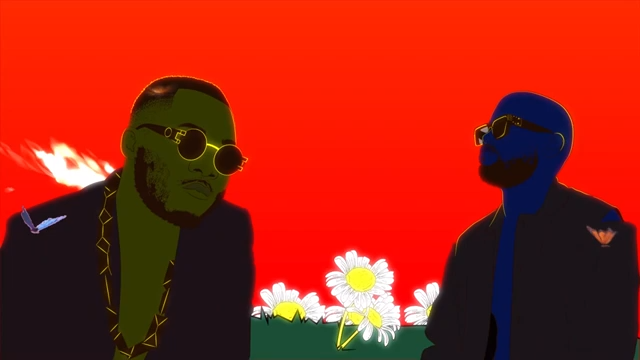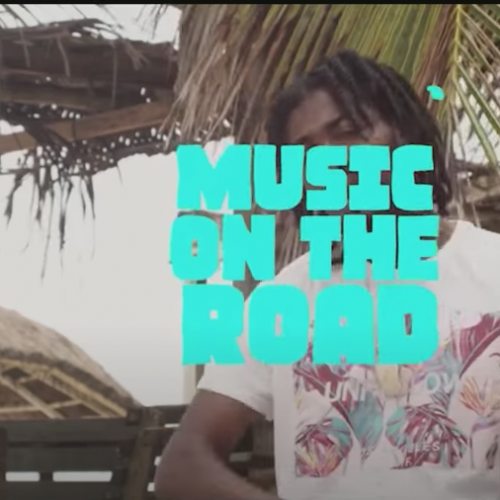Kyekyeku – “Pay Me (Friday Night)”

Originally published in the Lungu Lungu column at the Fader.
Yesterday was Ghana’s independence day: the nation is 56 years young. For the occasion, I had written a kind of “state of the Ghanaian music industry” piece, which makes sense as Ghana’s Musicians’ Union organizes the first ever Ghana Music Week, hosting a massive concert featuring many of Ghana’s top artists, with the Ghana Music Awards are right around the corner too. So the music industry here is buzzing like crazy.
But as I started to write about all of this, I realized I was not only missing a lot of important bits, I was also writing overly technical stuff about how the industry works—not a very promising piece. This is when I had the type of epiphany I feel can only happen in Ghana. I can’t tell you how many times I’ve felt cornered into inextricable situations here, which suddenly open up thanks to some extra random coincidence. Well this morning, as I wrapped my head around making sense out of an industry which possibly makes no sense to anybody at all, I received the cornerstone of what I should really be writing about: some proper palm wine music.
Kyekyeku—pronounced tchetchekoo—is a name you hear in Accra if you go out to listen to live music. I’ve heard him accompany countless shows on the guitar, and just last week, I heard him perform an impromptu palm wine piece at the Republic, one of my favorite joints in Accra. I was finally compelled to reach out to him, not knowing he has not only recorded some tracks already, but he has done so in collaboration with the carrier of Ghana’s palm wine tradition, Agya Koo Nimo.
Palm wine music is the melodic backbone of Ghanaian highlife: picture a bunch of guys under a tree, sipping on palm wine, playing the guitar and singing along. While the concept is simple, palm wine chords are quite complex: I remember when I met Koo Nimo in Kumasi in 2010, listening to his music and thinking immediately about Brazil. He told me: “Palm wine music is complex chords assembled into simple melodies. Bossa nova or chóro have simple chords assembled into complex melodies.”
Since that day, I dream of the time when palm wine music reaches the same level of international recognition as bossa nova. As I spoke with Kyekyeku I realized that day may be coming sooner than I thought.
Kyekyeku has an advantage: he trained with the keeper of palm wine music in its purest form, but as a young musician playing on Accra’s live circuit, he is immersed into modern Ghanaian music. His decision to “zero in on palm wine music” as he tells me, only happened recently. “I play all sorts of music, but I want to be known for palm wine.”
That’s a significant challenge, considering Kyekyeku is a very popular musician here, who is choosing an avenue few dare to get into. “For me it was a very daring move to make,” he says, “because I have to give up on a lot of the cool stuff going around. That’s the dilemma for a lot of young people here: highlife is considered old and archaic, so everybody’s trying to do azonto and stuff, which is not bad, but things have to be balanced out.”
I am a huge fan of all things azonto and fruity loops, however, as Kyekyeku puts it, “things have to be balanced out,” and clearly the balance is off. There is little live music, and way too few holders of the palm wine and highlife melodic tradition. Even when I first came to Ghana in 2007, you heard a lot of highlife, Ofori Amponsah type digital highlife. Today, hearing new highlife songs is all too rare—gospel aside, but that’s a whole different story.
The song featured today is a Ghanaian classic (also covered recently by the Busy Twist), musically close to its roots, with linguistic twists courtesy of Kyekyeku to make the lyrics more palatable to a young audience. “Some of the slang and jargon I use in the song is very modern, whereas Koo Nimo sings in a very traditional way. We blend energies and feelings, to show that this music is dynamic. It’s a way to connect with both the old and new generations.” The two also connect with the world as they feature Indian tabla master Vishal Nagan.
Ironically, the conclusion of this story is the same I had intended in my initial analytical piece: if Ghana’s music industry needs one thing, it’s more musicians. The Ghanaian government, foreign consulting firms and local media moguls are discussing what complex strategies need to be implemented, when Kyekyeku is already a living example of the simple steps that need to be happening: train more musicians. Make instruments more accessible. Restore pride in musicianship by making it possible for musicians to make a living.
Ghana’s live music scene was once one of the liveliest in the continent. Today, live music options are few and far between. Before Ghana gives birth to the next Michael Jackson, it will need the next Quincy Jones, and for that to happen, it will need more performances, enabling more experimentation, more creative exchange. In other words: more live music. Some already know that, and are already making moves. More vim to you Kyekyeku.
RELATED
Music Video: in and out by betina quest
in and out is about all those times of finding yourself in between the 'here', the 'there' and the 'nowhere' while trusting you will eventually find your way and the peace within. The visuals depict that very state of mind and lure you into that special space. Take a...
Lyrics Video: Jeune Lio – My Love feat. Magasco
Follow up to Abidjan-based Cameroonian DJ and creative director Jeune Lio, here's the lyrics video to his debut single My Love featuring Magasco. Video animation was done by Ozaki & Tiemo. RELATED Follow up to Abidjan-based Cameroonian DJ and...
Music Video: Solid K – Music on the Road
Music on the Road was shot by Daniel Kwabena Marmo of The 3 Suns. According to Solid K, " The video tries to capture how I feel about music, it depicts how hard it is to explain with words. It shows what a surreal feeling it brings to me. As can be seen, I walk...
Kyekyeku – “Pay Me (Friday Night)”

Originally published in the Lungu Lungu column at the Fader.
Yesterday was Ghana’s independence day: the nation is 56 years young. For the occasion, I had written a kind of “state of the Ghanaian music industry” piece, which makes sense as Ghana’s Musicians’ Union organizes the first ever Ghana Music Week, hosting a massive concert featuring many of Ghana’s top artists, with the Ghana Music Awards are right around the corner too. So the music industry here is buzzing like crazy.
But as I started to write about all of this, I realized I was not only missing a lot of important bits, I was also writing overly technical stuff about how the industry works—not a very promising piece. This is when I had the type of epiphany I feel can only happen in Ghana. I can’t tell you how many times I’ve felt cornered into inextricable situations here, which suddenly open up thanks to some extra random coincidence. Well this morning, as I wrapped my head around making sense out of an industry which possibly makes no sense to anybody at all, I received the cornerstone of what I should really be writing about: some proper palm wine music.
Kyekyeku—pronounced tchetchekoo—is a name you hear in Accra if you go out to listen to live music. I’ve heard him accompany countless shows on the guitar, and just last week, I heard him perform an impromptu palm wine piece at the Republic, one of my favorite joints in Accra. I was finally compelled to reach out to him, not knowing he has not only recorded some tracks already, but he has done so in collaboration with the carrier of Ghana’s palm wine tradition, Agya Koo Nimo.
Palm wine music is the melodic backbone of Ghanaian highlife: picture a bunch of guys under a tree, sipping on palm wine, playing the guitar and singing along. While the concept is simple, palm wine chords are quite complex: I remember when I met Koo Nimo in Kumasi in 2010, listening to his music and thinking immediately about Brazil. He told me: “Palm wine music is complex chords assembled into simple melodies. Bossa nova or chóro have simple chords assembled into complex melodies.”
Since that day, I dream of the time when palm wine music reaches the same level of international recognition as bossa nova. As I spoke with Kyekyeku I realized that day may be coming sooner than I thought.
Kyekyeku has an advantage: he trained with the keeper of palm wine music in its purest form, but as a young musician playing on Accra’s live circuit, he is immersed into modern Ghanaian music. His decision to “zero in on palm wine music” as he tells me, only happened recently. “I play all sorts of music, but I want to be known for palm wine.”
That’s a significant challenge, considering Kyekyeku is a very popular musician here, who is choosing an avenue few dare to get into. “For me it was a very daring move to make,” he says, “because I have to give up on a lot of the cool stuff going around. That’s the dilemma for a lot of young people here: highlife is considered old and archaic, so everybody’s trying to do azonto and stuff, which is not bad, but things have to be balanced out.”
I am a huge fan of all things azonto and fruity loops, however, as Kyekyeku puts it, “things have to be balanced out,” and clearly the balance is off. There is little live music, and way too few holders of the palm wine and highlife melodic tradition. Even when I first came to Ghana in 2007, you heard a lot of highlife, Ofori Amponsah type digital highlife. Today, hearing new highlife songs is all too rare—gospel aside, but that’s a whole different story.
The song featured today is a Ghanaian classic (also covered recently by the Busy Twist), musically close to its roots, with linguistic twists courtesy of Kyekyeku to make the lyrics more palatable to a young audience. “Some of the slang and jargon I use in the song is very modern, whereas Koo Nimo sings in a very traditional way. We blend energies and feelings, to show that this music is dynamic. It’s a way to connect with both the old and new generations.” The two also connect with the world as they feature Indian tabla master Vishal Nagan.
Ironically, the conclusion of this story is the same I had intended in my initial analytical piece: if Ghana’s music industry needs one thing, it’s more musicians. The Ghanaian government, foreign consulting firms and local media moguls are discussing what complex strategies need to be implemented, when Kyekyeku is already a living example of the simple steps that need to be happening: train more musicians. Make instruments more accessible. Restore pride in musicianship by making it possible for musicians to make a living.
Ghana’s live music scene was once one of the liveliest in the continent. Today, live music options are few and far between. Before Ghana gives birth to the next Michael Jackson, it will need the next Quincy Jones, and for that to happen, it will need more performances, enabling more experimentation, more creative exchange. In other words: more live music. Some already know that, and are already making moves. More vim to you Kyekyeku.
RELATED
Music Video: in and out by betina quest
in and out is about all those times of finding yourself in between the 'here', the 'there' and the 'nowhere' while trusting you will eventually find your way and the peace within. The visuals depict that very state of mind and lure you into that special space. Take a...
Lyrics Video: Jeune Lio – My Love feat. Magasco
Follow up to Abidjan-based Cameroonian DJ and creative director Jeune Lio, here's the lyrics video to his debut single My Love featuring Magasco. Video animation was done by Ozaki & Tiemo. RELATED Follow up to Abidjan-based Cameroonian DJ and...
Music Video: Solid K – Music on the Road
Music on the Road was shot by Daniel Kwabena Marmo of The 3 Suns. According to Solid K, " The video tries to capture how I feel about music, it depicts how hard it is to explain with words. It shows what a surreal feeling it brings to me. As can be seen, I walk...



